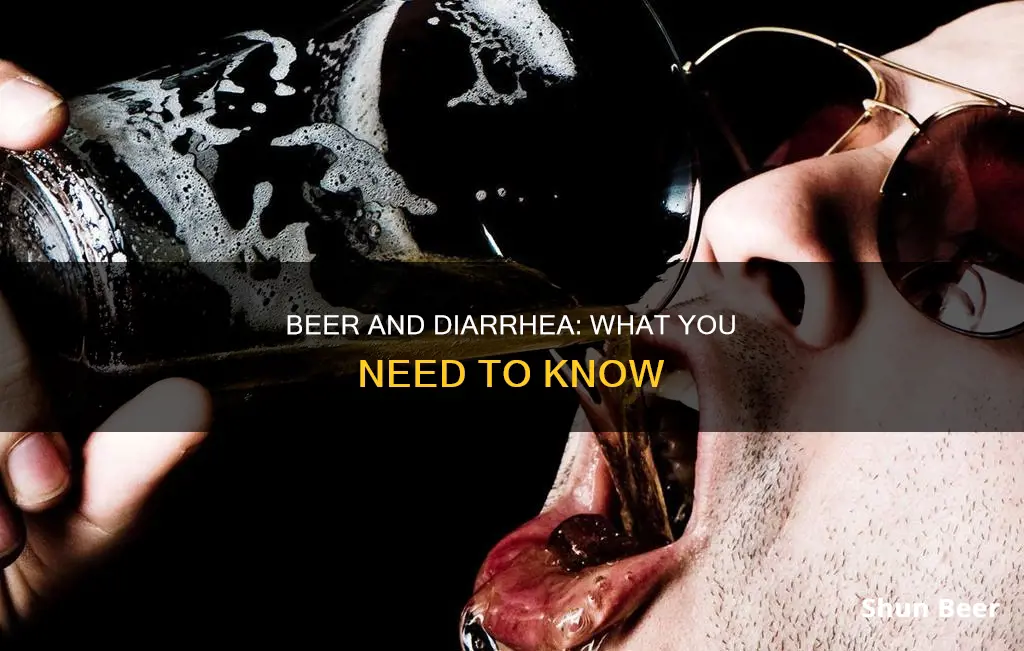
Alcohol can have a significant impact on the digestive system, and it is generally advised to avoid it when experiencing diarrhea. Alcohol can irritate the intestines, causing them to speed up digestion and resulting in diarrhea. This irritation can also lead to inflammation and changes in water absorption, further contributing to diarrhea. Beer, in particular, contains more carbohydrates than other forms of alcohol, which the body may struggle to break down while under the influence. Additionally, alcohol can cause dehydration, which can worsen diarrhea and lead to other health complications. Therefore, it is recommended to avoid alcoholic beverages when dealing with diarrhea and instead opt for low-sugar fruit juices, water, or herbal teas to stay hydrated and aid recovery.
What You'll Learn

Alcohol can worsen diarrhoea
Alcohol can cause agitation in the intestines, which can lead to diarrhoea. The muscles in the colon contract more frequently, pushing stool out faster than usual. This quickening can lead to diarrhoea, as the intestines do not have time to digest the passing food properly.
Additionally, alcohol can affect the normal functions of the digestive system at every stage. It can cause inflammation in the gastrointestinal tract and lead to more acid production in the stomach, increasing irritation and inflammation. This irritation can, in turn, lead to diarrhoea.
Alcohol can also affect water absorption in the large intestine. When alcohol is present, the large intestine does not function optimally, resulting in liquid stools and dehydration.
If you are experiencing diarrhoea, it is best to avoid alcohol and focus on rehydrating with water, broth, or other liquids.
Beer and Tylenol: Safe Mix?
You may want to see also

Beer contains carbs that are hard to digest
Drinking beer when you have diarrhea is generally not recommended. While beer may not be as high in carbohydrates as some believe, it can still be difficult to digest. Beer is made by fermenting grains such as barley and wheat, which naturally contain carbohydrates. The fermentation process breaks down these carbohydrates, but some remain in the final product. The amount of carbohydrates left in the beer depends on the specific fermentation process used.
Beer can be part of a low-carb diet in moderation, and it can even be a good source of soluble fiber and prebiotics, which promote digestion. However, for people watching their carbohydrate intake, limiting beer consumption may be necessary. This is especially true for beers with higher carbohydrate content or added sugars. Light beers, on the other hand, tend to be lower in both calories and carbohydrates.
The carbohydrates in beer are not easily digested, and this can be problematic for people with digestive issues. Beer also contains alcohol, which can affect the way the body digests food. Alcohol can cause the digestive system to speed up, leading to diarrhea. It can also delay digestion and cause constipation. Additionally, alcohol can irritate and inflame the digestive tract, worsening any existing diarrhea symptoms.
If you are experiencing diarrhea, it is important to manage your condition with your diet, including your choice of drinks. Alcoholic beverages can worsen diarrhea, and it is recommended to refrain from drinking to allow your body to recover. Instead, focus on staying hydrated with water, broth, or other hydrating liquids.
Exploring Beer Drinking on the Beach: Is It Allowed?
You may want to see also

Alcohol can cause dehydration
Drinking alcohol on an empty stomach can contribute to dehydration. Without food in the stomach, alcohol goes straight into the bloodstream instead of being absorbed more slowly through the stomach and small intestine.
Drinking alcohol also suppresses the release of the antidiuretic hormone vasopressin, which controls how much water the kidneys reabsorb and retain. This reduces fluid retention and increases urination.
To counteract alcohol-induced dehydration, it is recommended to:
- Consume alcohol in moderation
- Drink alcohol slowly
- Drink water while consuming alcohol
- Drink water regularly
- Drink other hydrating beverages
- Avoid sugary and caffeinated beverages
- Eat hydrating foods
It is important to note that while alcohol can cause dehydration, it is not the primary cause of dehydration that many believe it to be. Research has shown that drinking alcohol does not significantly increase urine output compared to drinking the same amount of water. However, it is still important to stay hydrated while consuming alcohol to support your organs, such as your liver and kidneys, which are working overtime to process the alcohol.
Beer and Lorazepam: Safe Mix or Risky Cocktail?
You may want to see also

Alcohol can irritate the gut
Alcohol can irritate and damage the gut, causing inflammation in the lining of the intestines. This can happen in several ways. Firstly, alcohol can be converted into a toxic chemical called acetaldehyde, which can damage DNA and prevent cells from repairing this damage. Acetaldehyde is also a Group 1 carcinogen, meaning it is equal in toxicity to tobacco smoke and asbestos.
Secondly, alcohol can affect the function of the digestive system, causing it to work faster than usual and resulting in a loose, watery stool. This is because the body is unable to absorb the normal amount of water back into the body, leading to diarrhoea.
Thirdly, alcohol is a diuretic, which means it causes the body to produce more urine than normal. This can lead to dehydration, as the person is urinating more often but not taking in enough fluids. As a result, the large intestine will absorb as much water as possible from waste before it leaves the body, leading to hard, dry stool that is difficult to pass.
Finally, alcohol can irritate the gut by causing inflammation in the lining of the intestines, which stops the gut from absorbing nutrients as well as it usually does. This means that anything the body cannot absorb will pass through the gut and out of the body as waste, resulting in more frequent bowel movements.
People with pre-existing gut problems, such as irritable bowel syndrome (IBS), may experience worse symptoms. Gluten in beer or tannins in wine can also irritate the stomach. Regular or excessive alcohol consumption can irritate the stomach lining over time, leading to more frequent gut problems.
Beer and Arrhythmia: Is It Safe to Drink?
You may want to see also

Alcohol can cause bacterial imbalance
Alcohol can irritate and inflame the digestive system, affecting the way your body digests food. This can result in either constipation or diarrhea.
Drinking alcohol can also cause a bacterial imbalance in the gut, known as dysbiosis. Dysbiosis is associated with greater inflammation and disease compared to a healthier microbiome.
Here's how it works: when you drink alcohol, the liver produces a substance called acetate, which then moves into the intestines. This acetate acts as a carbon source that supports the growth of bacteria. However, not all of the resulting bacteria are beneficial. Some of these bacteria can make the intestinal lining more permeable, allowing microbes, food particles, and toxins to pass through into the rest of the body.
Additionally, alcohol can increase the levels of certain microRNAs, which are small molecules that regulate protein synthesis. Specifically, alcohol increases the levels of miR-212 and miR-155. These microRNAs can inhibit the production of proteins that regulate the formation of tight junctions in the gut, leading to a "leakier" intestinal lining.
The imbalance of bacteria in the gut caused by alcohol consumption can have negative health consequences. It is associated with greater inflammation and disease and can contribute to conditions such as alcoholic liver disease.
Therefore, if you are experiencing diarrhea, it is generally recommended to avoid alcoholic beverages as they may worsen your symptoms.
Beer Gas: How Does It Work?
You may want to see also
Frequently asked questions
It is not recommended to drink beer or any other alcoholic beverage when you have diarrhea as it can worsen your symptoms and lead to dehydration.
It is important to stay hydrated when you have diarrhea. Water, broth, and other liquids can help restore your electrolytes and prevent dehydration. You can also try low-sugar fruit juice without pulp or herbal teas.
It is best to avoid fatty foods, dairy products, alcohol, sodas with high-fructose corn syrup, and artificial sweeteners. These can irritate your digestive system, worsen diarrhea, or lead to dehydration.







